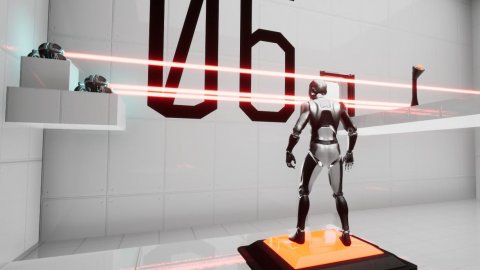Relash, proven of an intriguing puzzle game based on the manipulation of time

Relash
RetroGrade has released a demo of Relash on Steam, a third-person puzzle game based on manipulating time and using your past self to solve puzzles. We put the short demo of the game to the test and we are ready to tell you what we think in this trial of Relash.Me, Robot
Relash: the starting area of the demo on Steam Relash puts us in the shoes of a robot, a nameless mannequin inside a large industrial-style structure. We don't know anything about the possible plot of the game: moreover, we don't even know if the game will have a narrative that will support the whole adventure or if we will simply move from level to level.As you can also see from the images, the graphic style is very classic, a bit Portal-style (but less decadent and obscure), with a very generic robotic character. In the opening area, from which we can access the levels already covered, it is possible to see that there are hundreds of our clones. Are they ready to take our place? Will Relash tell us about soul, intellect, AI vs human spirit?
Various puzzle games have opted for these themes, so if Relash wants to do something similar, he'll have to go up against champions like The Talos Principle and Portal 2. Definitely not an easy task.
Puzzle game
Relash: the robotic protagonist above a button in level 6 Let's put aside these narrative speculations (which for some players will be nothing short of secondary ) and let's go to the beating heart of the game: the puzzles. The Relash demo features six levels, which we completed in about 10 minutes. Assuming that these are the opening levels of the game and that they are intended to teach us the basics of the gameplay without putting us too much in difficulty, we believe that the completion time is normal (the writer is used to complex puzzle games, mind you).Our character is able to jump and activate push buttons on the ground, which are used to open doors, deactivate laser turrets and drop crates. However, all these actions would be useless without Relash's fundamental mechanics: time travel.
In each level, which as regards this demo is always contained in a single room, offers two mechanical "portals", with fixed positions (it is not Portal). One of these is the entrance one and teleports us to the exit one, but in doing so the whole level begins to go back in time, repeating (on the contrary) all our pre-portal actions and the changes that occurred in the scenario.
Let's take an example. The room exit is at the top, on a bridge that crosses the room from side to side. There is no ladder or lift to go up. At the push of a button on the ground, a footboard protruding from the deck folds down and drops a crate placed on top of it. What happens when we reverse time? The crate starts from the ground and goes up, allowing us to use it as a passage to get to the top and exit the level.
This example is the simplest of all and things could get quite complex. Over the course of six stages, we were faced with environments with multiple crates to be moved, turrets to be deactivated and doors to be kept open. Nothing absurd or incomprehensible (we repeat, it took us less than two minutes per level, on average), but considering that we are talking about opening levels it is a good premise.
Even if it is not part of what has been tried, we add that Relash may have other ideas in store. The trailer, which you can see at the beginning of the article, shows more elaborate environments than those present in the demo, with other elements such as drones chasing us and the possibility of reversing gravity.
Relash: the protagonist above the buttons that deactivates laser turrets It will be interesting to understand how daring the developers will be in terms of mechanics and difficulty. It's easy to find simple and enjoyable little puzzle games (like the recent Faraday Protocol, review here), but hardcore fans of the genre are looking forward to a serious challenge for once. Also, the idea of using your "ghost" to complete puzzles is not an absolute novelty, so it will be important that Relash uses this mechanic in a unique way.
Let's close with a technical note. Being a demo, it's not particularly useful to discuss the graphics in depth, but for now Relash looks pretty immature: there are visual glitches, there is no v-sync and overall it wouldn't hurt a resolution increase. Nothing that cannot be fixed, especially considering that the release date has not yet been revealed even in a generic way.
The Relash demo gives us very little to try and it is therefore difficult to expose yourself with a judgment, even if preliminary. The basic idea, that is to turn back the time to interact with one's "ghost", is certainly not original, but if well exploited it could give us somewhat complex levels. What we tried in the demo was pleasant and we would have liked to try a few more sections: a positive sign, for sure. The big doubts are related to the (potential) plot and graphics, for now very generic and technically certainly not of the first level. We hope this version is just a snippet of what the developers have in store for us.